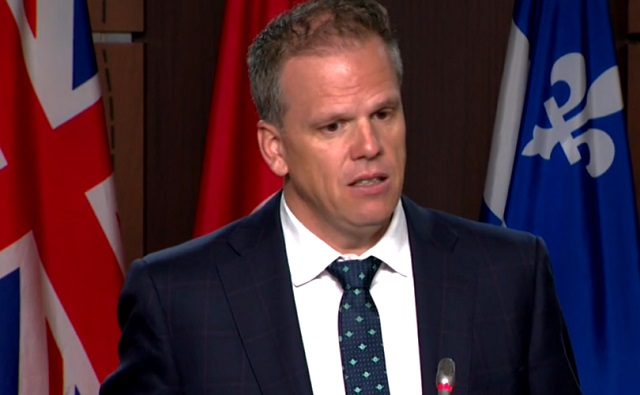Health
Canadian provinces push back after Trudeau’s health minister says MAiD will eventually be expanded

Liberal Health Minister Mark Holland
From LifeSiteNews
Holland has told Canadians that the government, is still seeking to expand MAiD (Medical Assistance in Dying) to those suffering from mental health issues; it just needs more time to prepare the ‘system.’
The Trudeau government still intends to provide euthanasia to mentally ill Canadians, but provincial health ministers are asking for the measure to be “indefinitely” postponed.
On January 30, health ministers from Ontario, Alberta, New Brunswick, Nova Scotia, Saskatchewan, Prince Edward Island, British Columbia, Yukon, Northwest Territories, and Nunavut appealed to Liberal Health Minister Mark Holland to “indefinitely pause” expanding MAiD eligibility to the mentally ill.
Health ministers from ON, AB, NB, NS, SK, PEI, BC, Yukon, NWT, and Nunavut are calling on Ottawa to "indefinitely pause" expanding MAID eligibility to mental illness.
Concerns about a consistent and safe approach, time for training, and an expected jump in patients#CdnPoli pic.twitter.com/1Hh4oJfsER
— Colton Praill (@ColtonPraill) January 30, 2024
On January 29, Holland told Canadians that the Liberal government, under the leadership of Prime Minister Justin Trudeau, is still seeking to expand MAiD (Medical Assistance in Dying) to those suffering from mental health issues; it just needs more time to prepare the “system.”
“We agree with the conclusion that the committee has come to that the system is not ready, and more time is required,” Holland told reporters, referring to a report that “fundamental issues” regarding the expansion have yet to be resolved.
Trudeau's health minister says "the system is at this time not ready and more time is required" to expand MAiD to those for whom mental illness is "the sole underlying condition" pic.twitter.com/Z4hYcduaWh
— The Post Millennial (@TPostMillennial) January 29, 2024
The new provision, which was to take effect in March, would have relaxed legislation around so-called MAiD to include those suffering solely from mental illness. This is a result of the 2021 passage of Bill C-7, which also allowed the chronically ill – not just the terminally ill – to qualify for so-called doctor-assisted death.
On Monday, following pushback from Canadians, Holland announced that Canada is not ready for the expansion and has determined to delay it. However, Holland stressed that this is not an abandonment of the new policy but merely a postponement.
“There are people who have, for decades, been trapped in mental torture, being in a horrific situation where they have tried everything and exhausted all avenues and under their own recognisance are saying that they want access to MAiD,” he claimed.
“What we’re saying is that … someone in that intractable situation … should have that right, but the system needs to be ready, and the system needs to get it right,” he added, not explaining how being killed would help their situation.
Holland did not reveal when the expansion is expected to take effect but disclosed that “those individuals are gonna have to wait a little longer” to end their lives by lethal injection.
Reporter: "Is your intention to still move ahead with MAiD for mental illness, just within a longer timeframe?"
Trudeau's health minister: "That's correct." pic.twitter.com/XzGs7QoexU
— The Post Millennial (@TPostMillennial) January 29, 2024
The Liberal government’s desire to expand MAiD to those suffering with mental health issues comes despite several experts, and provincial health ministers, warning against the move.
RELATED: Canada’s top pro-life group urges Trudeau gov’t to drop euthanasia expansion entirely
The provincial health ministers’ appeal echoes that of leading Canadian psychiatrist Dr. K. Sonu Gaind, who testified that the expansion of MAiD “is not so much a slippery slope as a runaway train.”
Similarly, in November, several Canadian psychiatrists warned that the country is “not ready” for the coming expansion of euthanasia to those who are mentally ill. They said that further liberalizing the procedure is not something that “society should be doing” as it could lead to deaths under a “false pretence.”
The expansion of euthanasia to those with mental illness even has the far-left New Democratic Party (NDP) concerned. Dismissing these concerns, a Trudeau Foundation fellow actually said Trudeau’s current euthanasia regime is marked by “privilege,” assuring the Canadian people that most of those being put to death are “white,” “well off,” and “highly educated.”
The most recent reports show that MAiD is the sixth highest cause of death. However, it was not listed as such in Statistics Canada’stop 10 leading causes of death from 2019 to 2022. When asked why MAiD was left off the list, the agency explained that it records the illnesses that led Canadians to choose to end their lives via euthanasia, not the actual cause of death, as the primary cause of death.
According to Health Canada, in 2022, 13,241 Canadians died by MAiD lethal injections. This accounts for 4.1 percent of all deaths in the country for that year,a 31.2 percent increase from 2021.
While the numbers for 2023 have yet to be released, all indications point to a situation even more grim than 2022.
Meanwhile, the pro-life Euthanasia Prevention Coalition (EPC)has launched a campaign to have the expansion thrown out. The campaign includes a rally and media conference on Parliament Hill on February 6 at 11 a.m. local time.
The movement also features a parliamentary postcard campaign, encouraging Canadians to send letters stating: “I demand that the government reverse its decision to permit ‘MAiD’ for mental illness alone.”
EPC also launched a petition to urge the Justice Minister to offer real care to those suffering from mental illness and not death by lethal injection.
Alberta
Alberta pro-life group says health officials admit many babies are left to die after failed abortions

From LifeSiteNews
Alberta’s abortion policy allows babies to be killed with an ‘induced cardiac arrest’ before a late-term abortion and left to die without medical care if they survive.
A Canadian provincial pro-life advocacy group says health officials have admitted that many babies in the province of Alberta are indeed born alive after abortions and then left to die, and because of this are they are calling upon the province’s health minister to put an end to the practice.
Official data from the Canadian Institute for Health Information (CIHI), which is the federal agency in charge of reporting the nation’s health data, shows that in Alberta in 2023-2024, there were 133 late-term abortions. Of these, 28 babies were born alive after the abortion and left to die.
As noted by Prolife Alberta’s President Murray Ruhl in a recent email, this means the reality in the province is that “some of these babies are born alive… and left to die.”
“Babies born alive after failed late-term abortions are quietly abandoned—left without medical help, comfort, or even a chance to survive,” noted Ruhl.
This fact was brought to light in a recent opinion piece published in the Western Standard by Richard Dur, who serves as the executive director of Prolife Alberta.
Ruhl observed that Dur’s opinion piece has “got the attention of both Alberta Health Services (AHS) and Acute Care Alberta (ACA),” whom he said “confirmed many of the practices we exposed.”
Alberta’s policy when it comes to an abortion committed on a baby older than 21 weeks allows that all babies are killed before being born, however this does not always happen.
“In some circumstances… the patient and health practitioner may consider the option of induced fetal cardiac arrest prior to initiating the termination procedures,” notes Alberta Health Services’ Termination of Pregnancy, PS-92 (PS-92, Section 6.4).
Ruhl noted that, in Alberta, before an “abortion begins, they stop the baby’s heart. On purpose. Why? Because they don’t want a live birth. But sometimes—the child survives. And what then?”
When it comes to the same policy for babies older that 21 weeks, the policy states, “For terminations after 21 weeks and zero (0) days there must be careful consideration and documentation concerning a Do Not Resuscitate order in anticipation of a possible live birth.” (PS-92, Section 6.4).”
Ruhl observed that the reality is, “They plan in advance not to save her—even if she’s born alive.”
If the baby is born alive, the policy states, “Comfort measures and palliative care should be provided.” (PS-92, Section 6.4).
This means, however, that there is no oxygen given, no NICU, “no medical care,” noted Ruhl.
“Their policies call this ‘palliative care.’ We call it what it is: abandonment. Newborns deserve care—not a death sentence,” he noted.
As reported by LifeSiteNews recently, a total of 150 babies were born after botched abortions in 2023-2024 in Canada. However, it’s not known how many survived.
Only two federal parties in Canada, the People’s Party of Canada, and the Christian Heritage Party, have openly called for a ban on late abortions in the nation.
Policy now under ‘revision’ says Alberta Health Services
Ruhl said that the province’s policies are now “under revision,” according to AHS.
Because of this, Ruhl noted that now is the time to act and let the province’s Health Minister, Adriana LaGrange, who happens to be pro-life, act and “demand” from her real “action to protect babies born alive after failed abortions.”
The group is asking the province to do as follows below:
- Amend the AHS Termination of Pregnancy policy to require resuscitative care for any baby born with signs of life, regardless of how the birth occurred.
- Require that these newborns receive the same level of care as any other premature baby. Newborns deserve care—not a death sentence.
- Recognize that these babies have a future—there is a literal waiting list of hundreds of families ready to adopt them. There is a home for every one of them.
While many in the cabinet and caucus of Alberta Premier Danielle Smith’s United Conservative government are pro-life, she has still been relatively soft on social issues of importance to conservatives, such as abortion.
Alberta
Alberta health care blockbuster: Province eliminating AHS Health Zones in favour of local decision-making!

Hospital Based Leadership: Eliminating the bureaucratic vortex in hospitals
Since Alberta’s government announced plans to refocus the health care system in November 2023, a consistent message has emerged from patients, front-line health care workers and concerned Albertans alike about the flaws of the prior system. Alberta Health Services’ current zone-based leadership structure is overly complex and bureaucratic. It lacks the flexibility and responsiveness needed to effectively support facilities and staff – particularly when it comes to hiring, securing supplies and adopting necessary technologies.
That’s why Alberta’s government is changing to a hospital-based leadership structure. On-site leadership teams will be responsible for hiring staff, managing resources and solving problems to effectively serve their patients and communities. Hospitals will now have the flexibility to respond, freedom to adapt and authority to act, so they can meet the needs of their facilities, patients and workforce in real time.
“What works in Calgary or Edmonton isn’t always what works in Camrose or Peace River. That’s why we’re cutting through bureaucracy and putting real decision-making power back in the hands of local hospital leaders, so they can act fast, hire who they need and deliver better care for their communities.”
“Hospital-based leadership ensures decisions on hiring, supplies and services are made efficiently by those closest to care – strengthening acute care, supporting staff and helping patients get the timely, high-quality care they need and deserve.”
“By rethinking how decisions are made, we’re working to improve health care through a more balanced and practical approach. By removing delays and empowering our on-site leaders, we’re giving facilities the tools to respond to real-time needs and ultimately provide better care to Albertans.”
AHS’ health zones will be eliminated, and acute care sites will be integrated into the seven regional corridors. These sites will operate under a new leadership model that emphasizes site-level performance management. Clear expectations will be set by Acute Care Alberta, and site operations will be managed by AHS through a hospital-based management framework. All acute care sites will be required to report to Acute Care Alberta based on these defined performance standards.
“Standing up Acute Care Alberta has allowed AHS to shift its focus to hospital-based services. This change will enable the local leadership teams at those hospitals to make site-based decisions in real and tangible ways that are best for their patients, families and staff. Acute Care Alberta will provide oversight and monitor site-level performance, and I’m confident overall hospital performance will improve when hospital leadership and staff have more authority to do what they know is best.”
“AHS is focused on reducing wait times and improving care for patients. By shifting to hospital-based leadership, we’re empowering hospital leaders to make real-time decisions based on what’s happening on the ground and respond to patient needs as they arise. It also means leaders can address issues we know have been frustrating, like hiring staff where they’re needed most and advancing hospital operations. This change enables front-line teams to act on ideas they see every day to improve care.”
The Ministry of Hospital and Surgical Health Services, Acute Care Alberta and Alberta Health Services will work collaboratively to design and establish the new leadership and management model with an interim model to be established by November 2025, followed by full implementation by summer 2026.
Quick facts
- Countries like the Netherlands and Norway, and parts of Australia have already made the shift to hospital-based leadership.
- The interim hospital-based leadership model will be implemented at one site before being implemented provincewide.
- Hospital-based leadership, once implemented, will apply only to AHS acute care facilities. Other acute care organizations will not be affected at the time of implementation.
Related information
-

 Health2 days ago
Health2 days agoLast day and last chance to win this dream home! Support the 2025 Red Deer Hospital Lottery before midnight!
-

 Aristotle Foundation2 days ago
Aristotle Foundation2 days agoThe Canadian Medical Association’s inexplicable stance on pediatric gender medicine
-

 conflict2 days ago
conflict2 days ago“Evacuate”: Netanyahu Warns Tehran as Israel Expands Strikes on Iran’s Military Command
-

 Energy2 days ago
Energy2 days agoCould the G7 Summit in Alberta be a historic moment for Canadian energy?
-

 Bruce Dowbiggin2 days ago
Bruce Dowbiggin2 days agoWOKE NBA Stars Seems Natural For CDN Advertisers. Why Won’t They Bite?
-

 Crime2 days ago
Crime2 days agoMinnesota shooter arrested after 48-hour manhunt
-

 Alberta2 days ago
Alberta2 days agoAlberta announces citizens will have to pay for their COVID shots
-

 Uncategorized1 day ago
Uncategorized1 day agoKananaskis G7 meeting the right setting for U.S. and Canada to reassert energy ties





